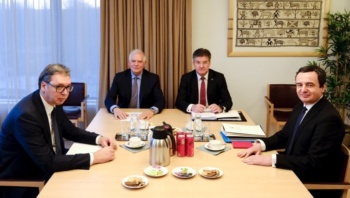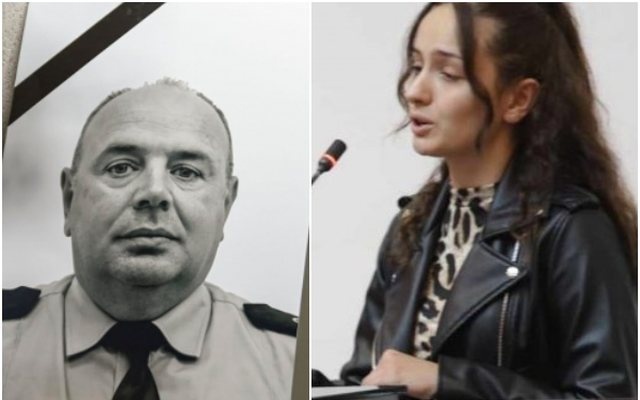Arbenita Bunjaku speaks at the funeral of her father Afrim after he was killed in northern Kosovo, September 25, 2023 (Politiko)
The large crowd is silent in front of the photograph of Afrim Bunjaku, a policeman in Kosovo. People set candles underneath the picture and light them. Grief and sadness is on the faces of those who have come to pay tribute to the man killed in a clash with ethnic Serbs on September 24.
The confrontation began when 30 armed civilians blocked a street in the town of Zvečan in the north of Kosovo. When police officers arrived to end the blockade, they were surprised by gunfire. The attackers killed Bunjaku and sought shelter in an Orthodox Church, which Kosovar officials are not allowed to enter without permission. After a gun battle lasting several hours, Kosovar police captured the attackers, three of whom had been killed.
Conflict in Kosovo between the minority of ethnic Serbs and the majority of ethnic Albanians is far from new. This time, however, a diplomatic crisis ensued. Serbia’s steadfast refusal to recognize Kosovo’s independence is again in the spotlight.
The Spiral of Violence
The spiral that led to the funeral of Afrim Bunjaku began with elections in Zvečan. Serbs boycotted to show their discontent with the Kosovar police and authorities, ensuring that the ethnic Albanian candidate became mayor with just a few votes.
Serbian demonstrations beleaguered the council house. Protesters hurled rocks and explosives. Police used tear gas. There were casualties on both sides.
Kosovo’s Prime Minister Albin Kurti accused Belgrade of responsibility for the violence. Serbian President Aleksandar Vučić, while rejecting the claim, justified the attacks on police with the argument that Kosovo’s government denies Serbs their rights.
Milan Radoičić, an ethnic Serb and Vice President of Kosovo’s “Serbian List” Party, undercut Vučić’s denial. He disclosed his involvement in planning of attacks, saying that they intended to galvanize the ethnic Serbians to confront perceived aggressions but not to kill. Serbian police eventually arrested Radoičić in Belgrade, allegedly because of international pressure, and he resigned his vice-presidential position.
While detaining Radoičić, the Vučić Government mobilized the Serbian army and stationed most of its troops close to Kosovo’s border. NATO increased the number of KFOR peacekeepers in Kosovo, sending another 600 British troops to the Balkans.
The European Union is proposing new elections in Zvečan. However, it is unlikely that these will ease tensions. The Kosovar government is holding off the EU: Prime Minister Kurti believes this would undermine his power within the whole of Kosovo and not just the Serbian-dominated north.
Is There A Way Out?
Both Kurti and Vučić are using aggressive rhetoric in a battle to deny each other legitimacy. The Kosovar leader shows no willingness to compromise over the position of 50,000 ethnic Serbs. Vučić’s hint at a potential de facto recognition of Kosovo is long gone.

Serbian President Aleksandar Vucic (L) and Kosovo Prime Minister Albin Kurti (R) with European Union High Representative Josep Borrell and EU envoy Miroslav Lajcak, Brussels, Belgium, February 27, 2023
And the issue is not just of two men vying for power. In Serbian history, Kosovo is seen as the birthplace of a united state with a battle against the Turks in 1389. In 20th-century Yugoslavia, Kosovo functioned as an autonomous Serbian region.
When Yugoslavia fell apart, ethnic Albanians declared independence in 1990. Serbia responded with repression and invasion.
In 1996, the ethnic Albanians began armed conflict with the Serbs, and three years later — after Serbia’s “ethnic cleansing” of some areas — NATO joined the conflict on the side of the Kosovo Albanians, leading to the withdrawal of the Serbian army. In 2008, Kosovo’s independence was declared yet again and acknowledged by most states.
In that context of both distant and recent history, Kosovo symbolizes for Serbian nationalists both their nation’s heritage and its downfall. Vučić plays to this with his declaration that the area should be “retaken”.
Still, there may be a way out of perpetual conflict. The intervention of the EU and the USA, initiating talks with both sides, took some of the heat out of the Zvečan confrontation.
That breathing space raises the possible leverage of EU membership for both Serbia and Kosovo. On September 30, less than a week after the killing of of Afrim Bunjaku, Vučić told London’s Financial Times:
Why would this [conflict] be beneficial for Belgrade? What would be the idea? To destroy our position we have been building for a year? To destroy this in a day? Serbia does not want war.
The President pointedly stated that a military intervention would render all past efforts to strengthen bonds with the EU pointless.
With Russia raising the European stakes with its invasion of Ukraine, the need for the EU to find a resolution has magnified. Its immediate mediation, and then its longer-term process to bring a stabilized Serbia and Kosovo into the European tent, is required.
But that glimmer of a way out will be no consolation for those who have already fallen victim to the power politics, posturing, and violence.
Arbenita Bunjaku, the daughter of Afrim Bunjaku, takes the podium. She says:
Daddy I don’t know how I will live without you. How can I live without my hero?…
I went inside the house and I didn’t see you. It is very heavy for me. No one can replace your place at home. You taught us everything, but how to live without you, never. Dad, you were a man who loved family, society and work.


Trackbacks/Pingbacks